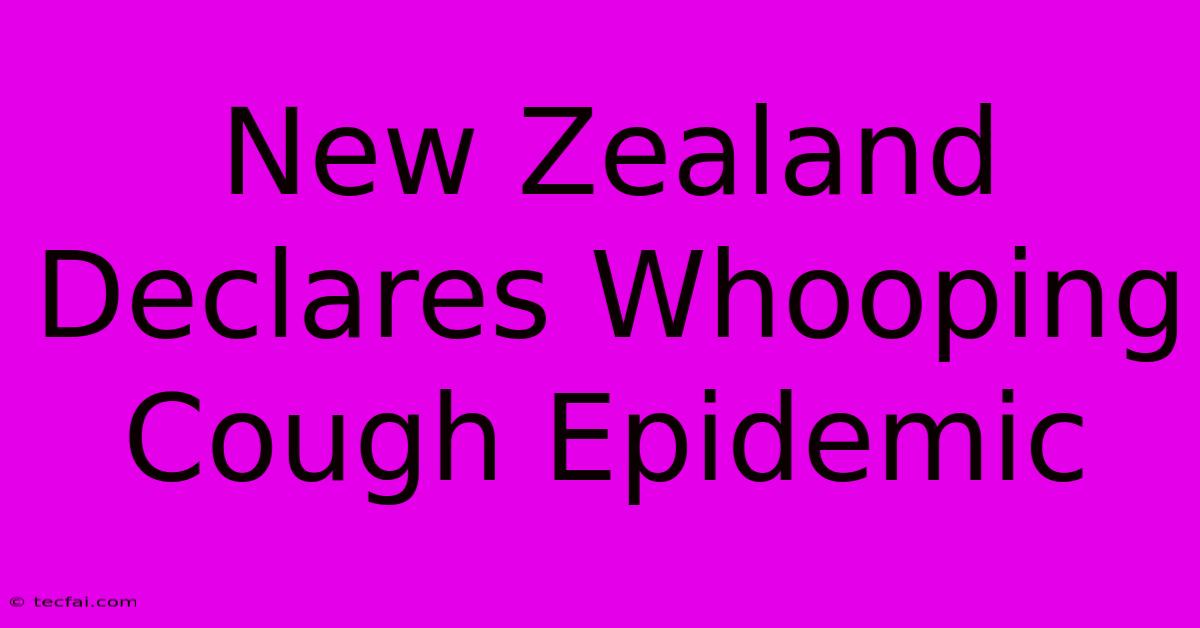New Zealand Declares Whooping Cough Epidemic

Discover more detailed and exciting information on our website. Click the link below to start your adventure: Visit Best Website tecfai.com. Don't miss out!
Table of Contents
New Zealand Declares Whooping Cough Epidemic: A Public Health Crisis
New Zealand's Ministry of Health has declared a whooping cough (pertussis) epidemic, raising serious concerns about public health. This declaration underscores the urgency of vaccination and preventative measures to curb the rapid spread of this highly contagious respiratory illness. The sharp increase in reported cases necessitates a comprehensive understanding of the situation and the steps being taken to mitigate the crisis.
Understanding the Whooping Cough Epidemic in New Zealand
Whooping cough, caused by the bacterium Bordetella pertussis, is characterized by severe coughing fits followed by a "whooping" sound during inhalation. While it can affect people of all ages, infants and young children are particularly vulnerable to severe complications, including pneumonia, seizures, and even death. The current epidemic in New Zealand highlights the significant threat posed by this preventable disease.
Factors Contributing to the Outbreak
Several factors may be contributing to the surge in whooping cough cases:
- Waning Immunity: The effectiveness of the pertussis vaccine can wane over time, requiring booster shots for optimal protection. A decrease in vaccination rates, or delayed booster doses, could leave individuals susceptible to infection.
- Increased Transmission: Highly contagious respiratory illnesses spread easily, especially in densely populated areas and during periods of close contact. Increased social interaction after periods of lockdown or social distancing may have facilitated transmission.
- Strain Variation: The emergence of new or more virulent strains of Bordetella pertussis could potentially impact vaccine effectiveness and increase the severity of infections.
- Underreporting: It's possible that the actual number of whooping cough cases is higher than officially reported, due to mild or asymptomatic infections going undiagnosed.
Public Health Response and Prevention Strategies
The Ministry of Health has implemented several strategies to combat the epidemic:
- Increased Surveillance: Enhanced monitoring and reporting of whooping cough cases are crucial for tracking the spread and identifying high-risk areas.
- Vaccination Campaigns: Public health officials are emphasizing the importance of vaccination, particularly for infants, pregnant women, and those in close contact with infants. Booster shots are recommended for adults to maintain immunity.
- Public Awareness: Educational campaigns are raising awareness about the symptoms of whooping cough, the importance of hygiene practices like handwashing, and the benefits of vaccination.
- Treatment and Management: Prompt diagnosis and treatment of infected individuals with antibiotics can help reduce the duration and severity of illness and prevent further transmission.
Protecting Vulnerable Populations
Infants are particularly vulnerable to severe complications from whooping cough. Protecting them is paramount:
- Vaccination of Pregnant Women: Vaccinating pregnant women provides passive immunity to their newborns, significantly reducing the risk of severe disease in infants.
- Close Contact Vaccination: Those in close contact with infants, including family members and caregivers, should ensure they are up-to-date with their whooping cough vaccinations.
The Importance of Vaccination
Vaccination remains the most effective strategy for preventing whooping cough. The pertussis vaccine, usually administered as part of the combined diphtheria-tetanus-pertussis (DTaP) vaccine for children and the tetanus-diphtheria-acellular pertussis (Tdap) vaccine for adults, significantly reduces the risk of infection and its severe consequences. Individuals should consult their healthcare provider to determine their vaccination needs and ensure they are appropriately protected.
Conclusion: Combating the Epidemic Together
The whooping cough epidemic in New Zealand serves as a stark reminder of the importance of public health initiatives and individual responsibility in preventing the spread of infectious diseases. By working together – through increased vaccination rates, improved hygiene practices, and prompt medical attention – we can effectively combat this epidemic and protect the most vulnerable members of our community. Staying informed and following the guidance provided by public health officials is crucial in mitigating the impact of this serious public health crisis.

Thank you for visiting our website wich cover about New Zealand Declares Whooping Cough Epidemic. We hope the information provided has been useful to you. Feel free to contact us if you have any questions or need further assistance. See you next time and dont miss to bookmark.
Featured Posts
-
Icc Issues Arrest Warrants Israel Officials
Nov 22, 2024
-
17 Wicket Win India Dominates Australia
Nov 22, 2024
-
Davidos 32nd Birthday Livestream Concert
Nov 22, 2024
-
India Vs Australia New Test Players
Nov 22, 2024
-
All Blacks V Italy Near Full Strength
Nov 22, 2024
